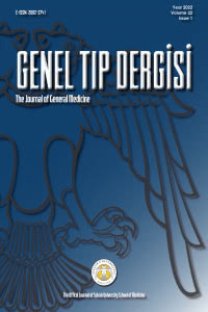Çörek otu (Nigella sativa) tohumunun insan hücresel bağışıklık sisteminin CD3+, CD4+, CD8+ hücreleri ve toplam lökosit sayısı üzerine etkileri
Amaç: Çörek otu (Nigella sativä) tohumunun insanlarda hücresel bağışıklık sisteminin T lenfosit alt grupları ve toplam lökosit sayısı üzerine etkisinin araştırılması. Yöntem: Çalışma, yaş ortalaması 24 olan 30 gönüllü erkek üzerinde yapıldı. Uygulama öncesinde her bir gönüllüden EDTA'lı standart kan sayım tüplerine 2 ml venöz kan örneği alınarak Coulter Epics XL Flow Sitometri cihazında CDS+ (olgun T lenfosit), CD4+ (yardımcı T lenfosit) ve CD8+ (süpresör-sitotoksik T lenfosit) hücreleri, Coulter STKS cihazında ise toplam lökosit sayımı yapıldı ve sonuçlar kontrol olarak kullanıldı. Deneklere 4 hafta süresince her gün 30 mg/kg çörek otu tohumu oral yoldan verildi ve 4. hafta sonunda tekrar kan örnekleri alınarak analiz edildi. Bulgular: CD3+ ve total lökosit değerlerinde istatistiksel açıdan anlamlı bir artış olduğu (sırasıyla P
Anahtar Kelimeler:
Nigella sativa, Bağışıklık sistemi, Bağışıklık, hücresel, Lökositler, Lenfosit alt grupları, CD8-pozitif T-lenfositler, CD4-pozitif T-lenfositler
The effects of black cumin (Nigella sativa) seeds on CD3+, CD4+, CD8+ cells of human immune system and total number of leucocytes
Objective: To investigate the effect of black cumin (Nigella sativa) seeds on T lymphocyte subsets of human immune system and total leukocytes. Methods: This study was conducted on 30 volunteered males with a mean age of 24. At the beginning, 2 ml of venous blood samples were taken from the volunteers and kept in standard glass test tubes with EDTA. CDS+, CD4+ and CD8+ cells in samples were counted with Coulter Epics XL flow cytometry equipment and total leukocytes with Coulter STKS; this data was used as control. The volunteers were asked to have 30 mg/kg of black cumin seeds every day for 4 weeks. At the end of fourth week, the blood samples were also taken from the volunteers and were analyzed. Results: It was observed that CDS+ and total leukocytes were increased significantly (P<0.01 and P<0.001, respectively). But the changes in other parameters were increased insignificant. Conclusion: In conclusion, it may be assumed that black cumin seeds may increase activity of human immune system.
Keywords:
Nigella sativa, Immune System, Immunity, Cellular, Leukocytes, Lymphocyte Subsets, CD8-Positive T-Lymphocytes, CD4-Positive T-Lymphocytes,
___
- 1. Baytop T. Türkiye’de bitkiler ile tedavi. İ.Ü. Yayınları No:3255; 1984.
- 2. Türker L, Bayrak A. Çörek otu (Nigella sativa L)’nun sabit ve uçucu yağ kompozisyonunun araştırılması. Standart 1996;430:128-37.
- 3. Worthen DR, Ghosheh OA, Crooks PA. The in vitro anti-tumor activity of some crude and purified components of black seed, Nigella sativa L. Anticancer Res 1998;18:1527-32.
- 4. Ghosheh OA, Houdi AA, Crooks PA. High performance liquid chromatographic analysis of the pharmacologically active quinones and related compounds in the oil of the black seed (Nigella sativa L.). J Pharm Biomed Anal 1999;19:757-62.
- 5. El-dakhakhny M. Studies on the chemical constitution of Egyptian Nigella sativa L. seed. II. The essential oil. Planta Med 1963;11:465-70.
- 6. Mahfouz M, El-dakhakhny M. Isolation of a crystaline active principle from Nigella sativa seeds. J Pharmacol Sci 1960;1:9.
- 7. Swamy SM, Tan BK. Cytotoxic and immunopotentiating effects of ethanolic extract of Nigella sativa seeds. J Ethnopharmacol 2000;70:1-7.
- 8. Medenica R, Mukerjee S, Huschart T, Koffskey J, Corbit W. Nigella sativa plant extract increases number and activity of immune component cell in humans. Exper Hematol 1993;21:1186.
- 9. Salemai ML, Hossainb, MS. Protective effect of black seed oil from Nigella sativa against murine cytomegalovirus infection. Int J Immunopharmacol 2000;22:729-40.
- 10. Topozada HH, Mazloum HA, El-dakhakhny H. The antibacterial properties of Nigella sativa seeds, active principle with some clinical applications. J Egypt Med Ass 1965;48:187.
- 11. El-fatatry HM. Isolation and structure assignment of an antimicrobial principle from the volatile oil of Nigella sativa L. Seeds. Pharmazie 1975;30:109-11.
- 12. Agarwal R, Khorya MD, Shrivastaga R. Antimicrobial and antelmintic activities of the essential oil of Nigella sativa L. Int J Exper Biol 1979;17:1214-5.
- 13. Ağaoğlu S, Berktaş M, Güdücüoğlu H. Çörek otu (Nigella sativa) tohumunun antimikrobiyal aktivitesi üzerine bir araştırma. Yüzüncü Yıl Üniversitesi Sağlık Bil Derg 1999;5:15-7.
- 14. Morsi NM. Antimicrobial effect of crude extracts of Nigella sativa on multiple antibiotics-resistant bacteria. Acta Microbiol 2000;49:63-74.
- 15. Hanafy MSM, Hatem ME. Studies on the antimicrobial activity of Nigella sativa seed (black cumin). J Ethnopharmacol 1991;34:275-8.
- 16. Saxena AP, Vyas KM. Antimicrobial activity of seeds of some ethnomedicinal plants. J Economic Taxonomic Botany 1986;8:291-9.
- 17. Elkadi A, Kandil O. The black seed (Nigella sativa) as a natural immune enhancer. First International Conference on Scientific Miracles of Quran and Sunnah; 1987 Oct; Islamabad-Pakistan.
- 18. Haq A, Abdullatif M, Lobo PI, Khabar KSA, Sheth KV, Al-sedairy ST. Nigella sativa: Effect on human lymphocytes and polymorphonuclear leukocyte phagocytic activity. Immunopharmacology 1995;30:147-55.
- 19. Haq A, Lobo PI, Al-tufail M, Rama NR, Al-sedairy ST. Immunomodulatory effect of Nigella sativa proteins fractionated by ion exchange chromatography. Int J Immunopharmacol 1999;21:283-95.
- 20. Nair SC, Salomi MJ, Panikkar B, Panikkar KR. Modulatory effects of Crocus sativus and Nigella sativa extracts on Cisplatin-induced toxicity in mice, J Ethnopharmacol 1991;31: 75-83.
- ISSN: 2602-3741
- Yayın Aralığı: Yılda 6 Sayı
- Başlangıç: 1997
- Yayıncı: SELÇUK ÜNİVERSİTESİ > TIP FAKÜLTESİ
Sayıdaki Diğer Makaleler
Salmonella hepatiti: Tıkanma sarılığı ile karışan iki olgu
Celalettin VATANSEV, Murat GÖLCÜK, Hüseyin YILMAZ, Ahmed PAMUKÇU
Üst gastrointestinal sistem kanamaları: 52 vakanın incelenmesi
Ertuğrul KAYAÇETİN, Hakkı POLAT
MEHMET SALİH KAYA, MEHMET KARA, HANEFİ ÖZBEK
Murat GÖLCÜK, Şükrü TOPRAK, MUSTAFA ŞAHİN, Hatice PAŞAOĞLU
Safra kesesinin skuamöz hücreli karsinomu
YAŞAR ÜNLÜ, Orhan ALİMOĞLU, CEYHAN UĞURLUOĞLU, Kemal BEHZATOĞLU, Zehra DEMİROĞLU
Bölümlenmiş ve bölümlenmemiş makale özlerinin karşılaştırılması
Kalp hastalıklı çocuklarda aşı uygulanma pratiği
OSMAN BAŞPINAR, F. Yasemin GÜLTEKİN, Sayime GÜN, Gülhan İRİŞ, Sevim KARAASLAN
